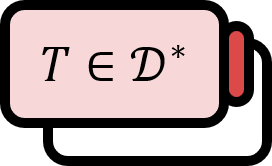Multiplication of a Distribution with a Smooth Function
Buildup
A distribution cannot be multiplied with a function defined on the real space since its domain is a function space. However, in the case of regular distributions, there exists a corresponding locally integrable function $u\in L_{\mathrm{loc}}^{1}$, so it is represented as follows.
$$ T_{u}(\phi)=\int u(x)\phi (x) dx,\quad \phi \in \mathcal{D} $$
Therefore, considering some action $S$ applied to $u$ by which we can obtain $Su=u^{\prime}$, if $u^{\prime}$ remains a locally integrable function, then there exists a corresponding distribution $T_{u^{\prime}}$. The idea is to think of the action on $u$ as being similar to the action on $T_{u}$. This idea is extended to the entire set of distributions to define the multiplication of a distribution and a function.
Let’s assume that a function $f \in C^{\infty}$ is given. Then, the product with $u$, which is $fu$, is still locally integrable. Therefore, a corresponding distribution exists as follows.
$$ \begin{align*} T_{fu}(\phi) &= \int f(x)u(x)\phi (x) dx \\ &= \int u(x)\left( f(x)\phi (x) \right)dx \\ &=T_{u}(f\phi) \end{align*} $$
Definition1
The multiplication of a smooth function $f$ and a distribution $T$ is defined as follows.
$$ f(x)T(\phi):=T(f\phi) $$
Gerald B. Folland, Fourier Analysis and Its Applications (1992), p311-312 ↩︎
